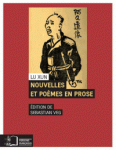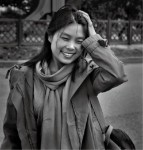Two months ago, we have already mentioned the “Read Paper Republic”program. On Thursdays, the site of these English translators living in China, Great Britain or the United States, publishes a translation of a short story or poem by a contemporary Chinese writer.
This initiative has been able to support writers with a limited audience outside China and created interest on social networks for Chinese literature. In recent weeks, texts of good quality have been published online.
1 / “Crows” by Cao Wenxuan:
Translated by Helen Wang, one of the leaders of “Paper Republic” who also published an English translation of “Bronze and Sunflower” (1). A novel which was translated into French by Brigitte Guilbaud for the publisher Philippe Picquier in 2010; a book I had enjoyed reading.
Cao Wenxuan is professor of literature at Beijing University; some of his fiction, especially for youngsters, have become classics of the curriculum.
 “Crows” explains that crows, birds not favourites in China, are well accepted in Japan, and Tokyo in particular, even if these beautiful birds become too numerous and somewhat a nuisance.
“Crows” explains that crows, birds not favourites in China, are well accepted in Japan, and Tokyo in particular, even if these beautiful birds become too numerous and somewhat a nuisance.
After the crows, pigeons in a novella“A very special pigeon”, also translated by Helen Wang. Two children, pigeon breeders; Xiaowang is one, from a rich family, who raises racing pigeons. One of his pigeons is saved by Qiuhu, a poor child, with a father lost with gambling, who has only common pigeons. The rivalry between the two young boys will be settled by one of their pigeons which won a 3500 km long race.
2 / Two prose poems by Lu Xun:
These texts are extracts from “Wild Grass”, a collection of twenty essays / prose poems, published in Beijing in July 1927. “Autumn Night” and “A Splendid Tale”, a brilliant translation by David Haysom and Karmia Olutrade, who, together, are responsible for editing the magazine Pathlight.
The first text is a dreamlike night scene in which the ego of the poet blends into the landscape as in many classical poems. “A splendid Tale” is a return to childhood and Shaoxing hometown of Lu Xun.
“Wild Grass” was like the short story collections “Cries” and “Wanderings”, translated into French by Sebastian Veg, a remarkable critical edition … (2)
 The question of the autonomy of literature in relation to politics is at the heart of the thinking and writing of Lu Xun. The split between the nationalists and the communists with the massacres of Shanghai in 1927, will lead writers to take their responsibilities.
The question of the autonomy of literature in relation to politics is at the heart of the thinking and writing of Lu Xun. The split between the nationalists and the communists with the massacres of Shanghai in 1927, will lead writers to take their responsibilities.
“Weeds” marks the end of the strictly literary activity of Lu Xun. As he says in his foreword: “After that I did not write anything similar. As time changed from day to day, one did not need that kind of text, or even to feel that kind of impressions “. In Red China, critics have for a long time considered these texts as counter revolutionary or at least dangerous, but that did not prevent Mao Zedong to praise Lu Xun “the commander in chief of the Chinese Cultural Revolution …”
3 / Two short stories by Lu Min:
Two texts translated by Helen Wang: “A second pregnancy” (1980) and “Xie Bomao RIP” (2014). Lu Min is just over forty, she lives in Nanjing and is considered as one of the most promising writers of her generation; collecting awards including a Lu Xun prize in 2012, she is Vice President of the Writers Union of Jiangsu.
She attended no university, but followed the Post Office school. Her father worked in a factory and her mother taught Chinese. After several years at the post office in Nanjing, she was saleswoman, secretary, journalist and began writing at twenty five years. She has published six novels and a dozen short story collections, divided between the city (Nanjing) and her idealized region of origin (Dongtai).
“A second pregnancy” is more or less the history of her family. Pressure on her parents to have her mother accept the one-child policy and not carry out a second pregnancy. An abortion is decided because the midwife announced that it would probably be a girl. But the mother gives birth prematurely to a girl …, finally does not lose her job but must pay a fine of four months of salary!
“Xie Bomao RIP” is a high-quality short story: Li Fu has been a model postman; for his last years he is responsible for “dead “ letters”, those which can not be distributed. He has in the past found many recipients, but now with the Internet there is less and less letters and a lot of advertising mail of no interest.
He is astonished to find regular letters from a certain Chen from Nanjing addressed to Xie Bomao with different addresses corresponding to streets of Nanjing which have disappeared. This Chen has a little girl who has invented an imaginary friend. He will do the same and send blank paper to Xie Bomao who somehow becomes his clone.
Li Fu, finding no trace of Xie Bomao, will search for Chen near the box where the letters are posted with a sign around his neck indicating Xie Bomao. This will last a year and two months but will eventually bring results …
But when he retires, this job will not survive!
Bertrand Mialaret
(1) Cao Wenxuan, “Bronze and Sunflower”, translated by Helen Wang. Walker Books, april 2015, 400 pages.
(2) Lu Xun, short stories and prose poems. Translation, notes and afterword by Sebastian Veg. Editions Rue d’Ulm, 2015, 660 pages.







